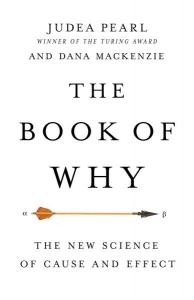Pearl/Mackenzie: The Book of Why
For this column, NASW book editor Lynne Lamberg asks NASW authors to tell how they came up with the idea for their book, developed a proposal, found an agent and publisher, funded and conducted research, and put the book together. She also asks what they wish they had known before they began working on their book, what they might do differently the next time, and what tips they can offer aspiring authors. She then edits the A part of that Q&A to produce the author reports you see here. Publication of NASW members’ reports in Advance Copy does not constitute NASW’s endorsement of their books. NASW welcomes your comments, and hopes this column stimulates productive discussions.
THE BOOK OF WHY:THE NEW SCIENCE OF CAUSE AND EFFECT
Judea Pearl and Dana Mackenzie (NASW member)
Basic Books, May 15, 2018, $32.00
ISBN-10: 046509760X; ISBN-13: 978-0465097609
Mackenzie reports:
The Book of Why was my chance to finally write The Story That Got Away.
In 1997, Science asked me to write an article about the newly founded Microsoft Research Lab. I threw on a suit, flew up to Redmond and interviewed various people, who were all in love with a machine learning technique called Bayesian networks. Their inventor and guru, I was told, was a computer scientist at UCLA named Judea Pearl.
I came home determined to write a follow up article about Bayesian networks. Then I looked up Judea Pearl online … and found out that he was no longer working on them! Instead, he was doing research on something rich and strange: causality. It was like a mash up of David Hume, statistics and AI. But how could a fledgling science writer pitch an article on such a topic? I couldn’t see how, and I dropped the idea.
Seventeen years later, out of the blue, an e-mail appeared in my inbox. “I enjoyed your interview in Amstat News,” wrote Judea Pearl. “Perhaps you are the person I am looking for: someone eager to author a popular book, A Brief History of Why.” It was the easiest “yes” of my science-writing career. (I changed the title a bit, though.)
We have all heard the aphorism “Correlation is not causation.” Scientists have used it as an excuse to avoid talking about causes altogether. Judea’s research has made this taboo obsolete: One can draw causal conclusions from a judicious combination of pre-existing scientific knowledge and data. Our book explains how. I hope you will find it the most quietly subversive science book you read this year.
I never expected to write a collaborative book. Now that I have done it, the most important advice I can give to anyone contemplating such a project is to know your co-author, to absolutely believe in the message you are conveying, and to make sure that they respect you as much as you respect them. And my other advice is: Never forget the stories that got away. They may yet have their moment in the sun.
Contact info:
- Dana Mackenzie, 831-465-1063, scribe@danamackenzie.com, http://danamackenzie.com
- Book website: Basic Books, https://bit.ly/2lwovFM
- Judea's website, http://bayes.cs.ucla.edu/WHY/
- Agent: John Brockman
- Publicists: Carrie Majer, 212-354-0665, Carrie.Majer@hbgusa.com;
Kait Howard, 212-364-0663, Kate.Howard@hbgusa.com
NASW members: will your book be published soon? Take advantage of this opportunity for shameless self-promotion. Submit your report for Advance Copy.
Tell your fellow NASW members how you came up with the idea for your book, developed a proposal, found an agent and publisher, funded and conducted research, and put the book together. Include what you wish you had known before you began working on your book, or had done differently.
See https://www.nasw.org/advance-copy-submission-guidelines.
Thinking of writing a book? If you are a NASW member, you may access a list of more than 150 books and online resources to help you craft your book proposal, find an agent and funding sources, negotiate your contract, learn about self-publishing, publicize and market your book, and more at https://www.nasw.org/article/write-book.
Send book info and questions about book publishing to Lynne Lamberg, NASW book editor, llamberg@nasw.org.

